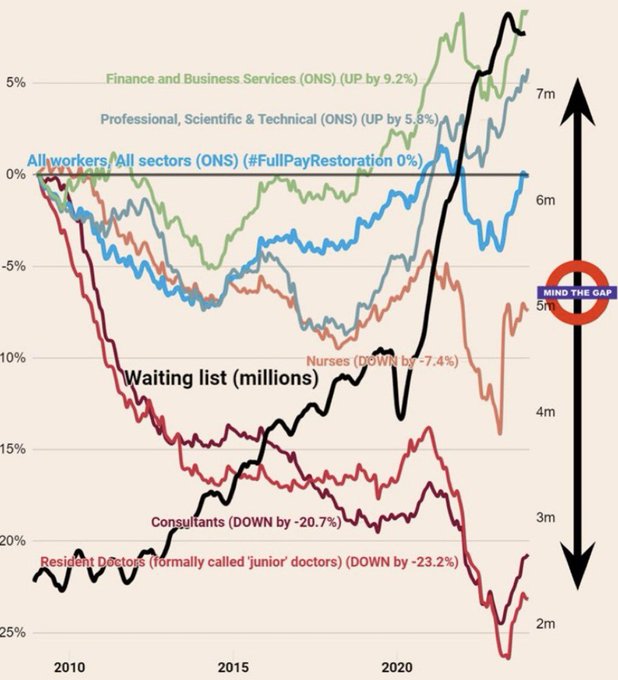Data from the FT. This nonsense of "we've all suffered because of inflation" is just factually and patently untrue. Doctors have experienced the worst erosion of pay of any professional group in the country by a country mile.
Personally I will be voting to reject the deal. Here's why. The 21% figure is nonsene and just marketing spin from the government.
- ~8% was already awarded to us last year. 6% + £1000 consolidated is already being awarded to us this year by the DDRB (works out to about 9%). So effectively the only new thing that has been offered by this Labour government is 4% extra for the 23/24 year.
- My background, like many of my colleagues, is that of academic excellence since childhood. Straight A*s at GCSE. Straight A*s at A-level. My mates who went into the city (law/finance/tech) have been on £100-150k since their mid 20s. Those of us that went into medicine knew we'd never match the private sector earnings we could get, but there has always been a social contract that if you're going to bring the exceptionally skilled doctor workforce under a monopsony employer then there has to be a fair financial compensation for that in exchange for their public service. Consultants in this country earn ~£100k-£140k regardless of specialty, after the longest specialty training of any country in the world (to squeeze maximum labour from you). It's a joke. Ireland 280k euros. Australia 400k+. Canada 500k+. The middle east 250-300k tax free. The USA even sillier numbers into the 7 figures.
- I have well over a decade of training, am a dual specialist in two fields, and run major tertiary/national level intensive care units at nights and out of hours. I worked in insane conditions during the COVID pandemic, and experienced things most members of the public with office jobs could never even have nightmares of. All of this is to say, I am NOT worth less than an equivalent doctor from 10 or 12 years ago.
- Even with this deal, we're still ~23% away from pay restoration to 2008 levels.
- A physician's assistant (now called physician associates) start on £47k now. That is someone who didn't have the grades or ability to get into medical school, has nowhere near the same academic pedigree, and has done a 2 year watered down crash course to be able to work as a PA. There is no circumstance where any doctor, of any grade (even a 1st year doctor starting on £36k now after 6 years of medical school) should be paid significantly less than their assistants.
The concept of public sympathy or support is just nonsense I'm afraid. The public have always been ****** off about train/tube drivers and their strikes, and yet they consistently get their annual pay rises. The fact is, this is an employment and pay dispute with the government. Whether you have support and sympathy for my colleagues and I or not, when you are a major trauma victim and your body and limbs are unrecognisable mush on a pavement, or you go into cardiogenic shock and feel like you're drowing as your lungs fill with fluid, or your intracranial pressure rises so high that your brain starts leaking out of your ears, you will be dependent on my skillset and I will gladly apply my years of knowledge, qualifications, and experience toward saving your life. I just expect to be paid properly.
And if you can't that's fine, if you want to pay third world salaries then that's a choice you can make. But then expect third world level healthcare (as the NHS is currently experiencing and providing), whilst my colleagues and I enjoy triple/quadruple salaries abroad.
Whether my skillset goes toward saving an Australian or Canadian or British life, it's all the same to me. I'm fulfilled and happy helping people and performing miracles on the ICU. The nationality of my patients doesn't matter to me, so why not get paid properly for it and provide a good life for my family and children?





